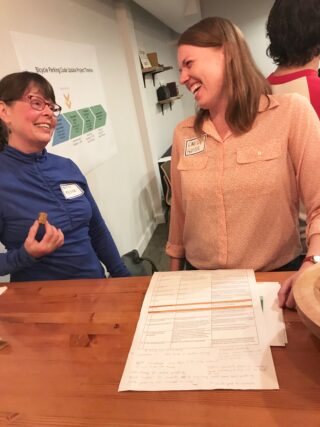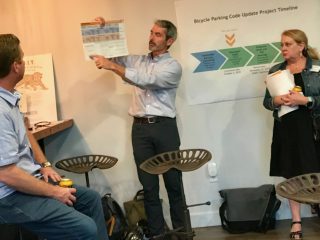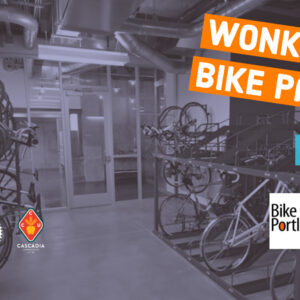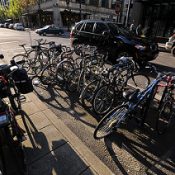
(Photos: Jonathan Maus/BikePortland)
This post is part of a contractual partnership between BikePortland and Portland Bureau of Transportation.
Last night we hosted a special Wonk Night event to bolster the City of Portland’s bicycle parking code update project.
As we shared last week, the bike parking chapter of the Zoning Code (33.266.200) was written in 1996. That means it doesn’t address today’s volume of riders, the types of bikes people ride, or best practices for the design, security, and location of bike parking. And it’s certainly not strong enough to handle projected growth — in terms of our bicycle ridership goals or the population overall.
That’s a problem.
If people don’t have an accessible and secure place to park their bikes, they’ll be less likely to ride. And for those who don’t bike yet, seeing bikes neatly lined up at high-quality parking spaces can be an inspirational nudge toward giving it a try.

With just one week left in the official comment period, last night’s gathering was a chance to inform and inspire people who care about making this important code as effective as possible. The event was also a nice bookend to BikePortland’s effort to raise the profile of this issue since we helped kick it off with a similar event back in 2013.
As per usual with Wonk Nights, one of the main goals was to hang out and socialize. It’s amazing what can happen when smart and curious people gather in the same room around yummy snacks and drinks. Thanks to our venue host Fat Pencil Studio we had a cool place to enjoy each other’s company and our drink sponsors Hopworks Urban Brewery and Reverend Nat’s Hard Cider kept everyone hydrated.
I love when people who are new to town — and/or new to bike advocacy — come out to events like this. Last night I met Ariel, who recently moved to Portland from Orange County, California. She said she rarely rode in her old town, but now she’s biking all the time. Ariel was excited to know Portlanders care so much about cycling that we have events like Wonk Night. I have a hunch we’ll be seeing her more in the future (I was thrilled when she met Bike Loud PDX Co-chair Emily Guise!). Another person I met was Josh Hetrick. Josh is a new board member of the Brooklyn Action Corps (a neighborhood association) and transportation is his one of his main interests.
Make your voice heard
The comment period ends at 5:00 pm on Monday, October 1st.
The PBOT project page has the email to send it to and a
link to the survey.
Other faces at Wonk Night included: Bureau of Transportation staffers Sarah Figliozzi, Joey Posada and Liz Hormann; Portland Planning & Sustainability Commission member Chris Smith; and members of the bike parking update project stakeholder advisory committee Hannah Silver (an architect) and Tom Kilbane (with Urban Renaissance Group, representing the developer’s perspective).
With a goal to arm advocates with enough information to make great comments and testimony at future hearings, we spent most of the night staring at handouts and asking PBOT staff questions about it. We alternated between one-on-one conversations and Q & A sessions with the entire group.
Advertisement

People spoke up with a variety of priorities and concerns. Among them was a desire to make bike parking areas accessible for people with disabilities and to make sure e-bikes and recumbent/cargo bikes are accommodated (they are). One person was curious how — or if — the new code would be enforced (answer: like all code violations they’d be reported to and handled by Bureau of Development Services).
While Portland’s proposed code is in line with peer cities who’ve updated theirs in the past 3-5 years, because it’s 20-years old the changes seem extreme to some observers — especially developers. They’re very concerned about how the new requirements will impact their ability to build and sell new units.

I asked project advisory committee member Tom Kilbane to share the developer’s perspective. While he encourages cycling and appreciates great bike parking as a daily rider himself, Kilbane said the new code doesn’t allow for enough flexibility. “Every building is different,” he said. “I know many builders who have have a bike room that’s not being utilized.” Kilbane also said that bike parking requirements are just another thing — along with new inclusionary zoning laws and excise taxes — that are being piled onto developers.
Kilbane’s comments sparked some healthy disagreement and questioning. I asked if those empty bike rooms might get more use if they were built to the new code standards. Someone else wondered if the money spent to provide quality bike parking is offset by the increase in tenants who find it attractive. Sarah Figliozzi from PBOT cautioned against an assumption that the free market will provide what’s needed. “Do we only want good bike parking at places where a company can afford it?,” she shared. “This is about raising the bar citywide.”
Figliozzi is confident the new code will bring the benefits of quality bike parking to service workers and lower-income Portlanders. But affordable housing advocates are another group that has raised concerns about how the code will increase the cost of projects. Asked how to respond to that concern, Planning Commissioner Chris Smith said, “I’d encourage them to look a the bigger picture. We know housing and transportation are the two biggest expenses… this [bike parking] can be a tool to lower overall costs and make transportation more affordable.”
If you want in on these conversations, there’s still time to make your voice heard. We need your help to make this code great! You’ll find the email to send comments (by 5:00 pm October 1st!) and a link to the online survey at PBOT’s website. It will be crucial to have strong testimony at the Planning & Sustainability Commission hearing in November and then again when it comes up for official adoption at City Council.
— Jonathan Maus: (503) 706-8804, @jonathan_maus on Twitter and jonathan@bikeportland.org
Never miss a story. Sign-up for the daily BP Headlines email.
BikePortland needs your support.







Thanks for reading.
BikePortland has served this community with independent community journalism since 2005. We rely on subscriptions from readers like you to survive. Your financial support is vital in keeping this valuable resource alive and well.
Please subscribe today to strengthen and expand our work.
If a bike room isn’t being used, it’s probably not designed right. Especially if you can see bikes on people’s balconies.
Why isn’t that beer and food sliding off the table?
Centrifugal force, duh.
Activism Gravity
Because the sandwiches aren’t sliders and the drink is cider, not clider?
I was so disappointed that I couldn’t clone my parent-self and my advocate-self to make it last night :(. One of the questions I have is how to put some pressure on building owners to provide bike parking for older commercial buildings (such as the one I work in) that meet even the current code. Our building supplied parking is miles away from the current code and as far as I know we have no recourse to force our building owner’s hand (despite providing them with reams of information and resources when they said they would put in parking). I think it’s very exciting the code is being updated, but there are so many commercial spaces in Portland that won’t be subject to the codes at all that affect thousands of commuters and other users of the buildings.
Those commercial spaces suffer by not being able to attract new tenants that demand such amenities. They then have to lower their asking price until nobody wants to lease their space due to it being do outdated. Eventually they sell and the building gets a remodel with good bike parking.
“One of the questions I have is how to put some pressure on building owners to provide bike parking for older commercial buildings (such as the one I work in) that meet even the current code. ”
threaten to move. ifn that don’t work – move.
Hi Carrie,
I met someone named Lindsay who had that exact concern. Her building is 100 years old and she’s bummed the code update won’t apply to her. My advice was to use the new code (once it’s passed, with all the good stuff hopefully still in it) as an advocacy tool. Even if a building owner isn’t legally obligated to abide by it, you can still use it as leverage by emailing applicable sections of it and pointing out that the building is way outdated and “Here’s the new code just passed by City Council that shows what bike parking is supposed to be like,” etc etc..
One aspect of this is that some sorts of upgrades ARE required by the building and zoning codes when a building is remodeled (beyond a certain cost) or undergoes a change of occupancy (converting a warehouse into retail, for example). Among those requirements, the project is required to devote up to 10% of its construction budget to “nonconforming upgrades”. Those include zoning code requirements such as bike parking along with parking lot landscaping, ground floor windows, etc.
So if a building was built per the zoning code in effect then, but the code requirements have increased in the meantime (as with bike parking) upgrading is required up to that 10% spending limit. You don’t have to achieve full compliance with current codes if you spend the 10% before achieving it. If you achieve all upgrades without spending the 10%, you don’t have to spend any more.
I suppose one idea worth considering would be to revise the zoning code so bike parking becomes the first priority for upgrading–that is, you have to spend towards achieving compliance with the current bike parking code first, and then tackle other upgrades only if you’ve achieved full bike compliance and still have some of your 10% budget left. But be aware that some of the other upgrades are also important.
“With a goal to arm advocates with enough information to make great comments and testimony at future hearings..”
thats an aspirational goal
‘Sarah Figliozzi from PBOT cautioned against an assumption that the free market will provide what’s needed. “Do we only want good bike parking at places where a company can afford it?,” she shared. “This is about raising the bar citywide.”’
uhm, if they cant afford it? solution?
She seems to have worded that awkwardly. She might have meant, “Do we want good bike parking only where a company voluntarily provides it, or should we require that all companies (or buildings) provide it as a condition of getting a building permit, whether or not they want to provide it?”
What you wrote is in no way close to what she is quoted as saying. So no, I doubt that is what she meant.
I wasn’t at the event, but having heard Sarah make the point at other presentations I believe Q’s summary is accurate.
What do you think she meant?
That’s reasonable advice Jonathan, but my limited experience of doing exactly what you recommended, being told that level of parking wasn’t needed (!), and then having a joke of bike ‘parking’ installed despite a cadre of people with cycling experience IN THE BUILDING and, when we’ve tried to negotiate on the topic 2 years later being told ‘but we installed bike parking’, is that sometimes we really need the regulatory stick. (The installed parking are hooks screwed into vertical wooden pillars with nothing to lock your bike to. And requires lifting your bike overhead to hang from hook.) And it’s unfortunate we don’t have a regulatory stick for old buildings. We can advocate and suggest all we want, but in a car-centric culture and reward system, sometimes sticks can be very helpful. Look at City Hall, for a very public example.
And for those who say ‘just move’, you know it’s not that simple. Especially in a city with rising rents and little leverage for the renter. And an employee of a business has even less options. Again, I know the City is trying to remove stupid low-hanging barriers to cycling and updating the code is so very welcome in that regard. But there are many buildings and resulting businesses that will still have these barriers.
The difficulty with a mandate for existing buildings is that in some cases good bike parking can reasonably be installed, and in other cases it isn’t feasible (maybe there simply isn’t a place for it) or the cost would be prohibitive. The city would probably need some way to figure out which category each building is in.
It’s not clear to me whether we are talking about visitor bike parking (outside the building, like staples on the sidewalk) or some sort of resident parking. Given the sorts of new development I see, which include commercial on the lower level with residences above, I think both are in order, and should be required. After all, if we are no longer mandating that new buildings necessarily include car parking, the money saved on this is still quite substantial compared to the cost of building bike parking. Providing adequate parking everywhere is certainly a prerequisite for increasing mode share.
Most of the code changes being proposed are related to long term bike parking, for people who live or work in the building. There are some changes related to short term bike parking, for people who are visiting the building, but they are smaller in scope.
Unfortunately, current code doesn’t allow a building to meet its short term bicycle parking requirement by providing staples in the sidewalk, even though PBOT will almost always require the developer to rebuild the sidewalk at their own expense. If the development can’t meet 100% of its short term parking requirement within the property lines, the developer has to instead pay a fee-in-lieu for all the spaces that would have been required. In my view this creates a really strong disincentive to providing short term parking, and I hope this gets revised as part of this project.
As long as the architects/engineers/contractors don’t ride bikes or use these kinds of facilities on a regular basis, they will always get it wrong at least 50% of the time, regardless of what the code says.
Architecture firms in Portland tend to have a really high cycle to work rate.
I will grant you that, but a lot of changes can and do occur between the design, engineering and construction phases; and, in my estimation, each subsequent group is less informed about bike parking than the previous one, so what actually gets installed can be a long way from what the original architect envisioned. Over the years I have seen so many poor, practically unusable installations of otherwise decent bike racks, it’s just sad. Plus, it’s often a really low priority for the developer and the city BDS inspectors, who may be even less informed than the aforementioned groups of professionals.
I’m sorry to ask this – lazy activism – but can anyone tell me what I should say in my email to city? What. specifically, are the recommendations that the wonk group came up with?